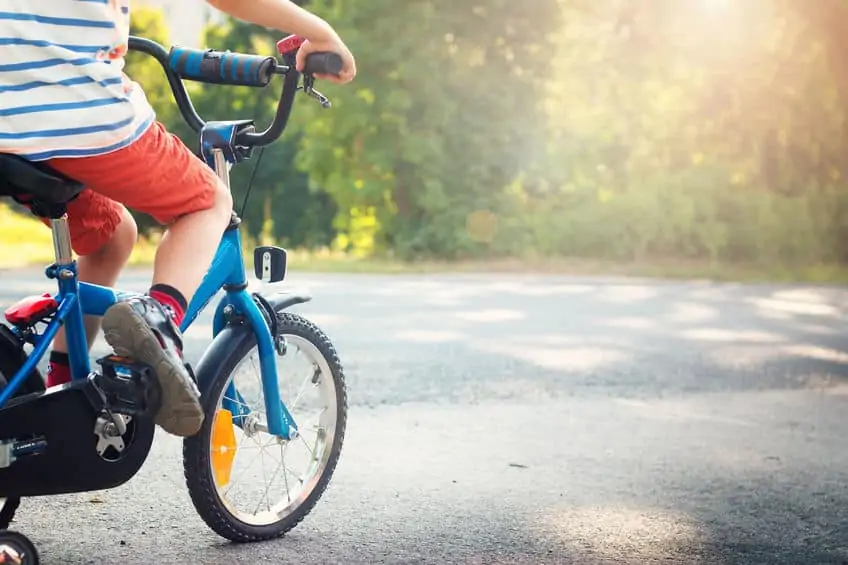How to foster a growth mindset in kids instead of a fixed mindset. Teach kids to believe in themselves, their abilities and work through failure and mistakes. 9 key ways to help kids develop growth mindset and help them feel capable, embrace their curiosity, build independence & develop persistence. Check out the Growth Mindset Set for kids, to build confident, resilient, thriving and positively-minded children.

Encouraging a Growth Mindset in Kids
There are two types of mindset – Fixed Mindset and Growth Mindset. When it comes to your kids, growth mindset is important because growth mindset will be the difference maker between being confident enough to keep trying when things are hard, or they make mistakes, and giving up.
Dr. Carol Dweck, a professor of psychology at Stanford University and author of the book Mindset: The New Psychology of Success, has extensively studied both types of mindsets in children.
So what is Fixed and Growth Mindset?
People with a fixed mindset believe their abilities are unchanging and predetermined.
Those with a Fixed Mindset believe they’re either smart or dumb, they are born with talent or they aren’t, and to put it plainly, you’re born with an ability (like being good at art, or sports, or reading) or you aren’t.
People – adults and children – who have a Fixed Mindset believe that when things don’t go their way, it’s because they aren’t good enough and that alone, is reason enough to give up. To them, no matter how hard they work, they can’t have success because it’s not part of their DNA or they lack the ability to be good at it.
Those who have a growth mindset.
Children with a growth mindset, believe everyone has the ability to be who and what they want to be and natural talent or intelligence is only a baseline. Growth Mindset essentially means a person doesn’t think in terms of smart and dumb, good or bad, athletic or not athletic, but hard work is what it takes to get to the next level or be better.
People who have a Growth Mindset know they can learn, they can achieve, and can be anything they want because of their dedication and hard work. This positive outlook is the kindling that fuels their passion and gives them grit to keep trying when things are hard, face failure, or make mistakes.
These two mindsets – Fixed and Growth Mindset – have been studied and found to have strong connection between a child’s:
- Academic intelligence
- Academic Success
- Ambition
- Abilities
- Longterm, Overall Life Happiness
Deck’s research also found a connection between a child’s belief about their academic intelligence and abilities, which play an critical role in their overall academic success, ambition, and in the longterm, overall life happiness.
“We found that students’ mindsets—how they perceive their abilities—played a key role in their motivation and achievement, and we found that if we changed students’ mindsets, we could boost their achievement.
Students who believed their intelligence could be developed (a growth mindset) outperformed those who believed their intelligence was fixed (a fixed mindset).”
You might be asking yourself how you can help foster Growth Mindset in kids, but also in yourself, right? The benefits of having a growth mindset pretty clearly outweigh the negative outcomes of a Fixed Mindset, so here are 9 ways you can help to promote a Growth Mindset:
Resource: Check out the Growth Mindset Set for kids, to build confident, resilient, thriving and positively-minded children.
9 Ways to Encourage a Growth Mindset in Children:
- Stop Your Own Self-Defeating Talk: Work on yourself first so you can be a good example for your children. No more self-defeating talk, it’s time to practice positive self-statements and affirmations. The brain works like a muscle and over time, will grow through hard work, determination and practice. It’s time to practice what you preach for your kids – but also because you need to believe it, too!
- Walk the Walk and then Talk the Talk: Show your children how to have this type of mindset and let your actions speak for you. What you say out loud, should be reinforced by how you act, and of course with your personal ambition. For example, say you set a goal of walking 10,000 steps every day. How do you do this? Create a calendar and hang it in the kitchen for everyone to see you log your steps and then get your kids involved. Have them help you be accountable and celebrate with you when you hit 30 days of 10,000 steps!
- Don’t Tell Kids They’re Smart, Gifted or Talented: You’re probably scratching your head at this, but listen to why this is important. Telling your child they are smart, gifted or talented implies to them that they’re born with these abilities, and can discourage them from giving additional effort and building growth if this is “how they are” or “what they’re born with.“
- Praise Growth Mindset: When your kids demonstrate growth mindset, praise them for this! Don’t simply praise by saying “good job” but praise effort, hard work, practice, kindness, bravery and characteristics of growth mindset that will help children see their true potential like not giving up and committing to their goal.
- Don’t Praise the Result: Yes, grades are important and scoring the winning goal at their soccer match matters, but only to an extent because this isn’t who your child is. Who they are is not a score or measurement of their knowledge or skills. Instead, praise the time and hard work they put into studying and effort and collaboration it took to score that awesome goal. Point out the characteristics it took to achieve their goals, succeed and time they committed to it.
- Pursue Passions: Children learn best when they’re passionately immersed in a topic or activity they’re interested in. Encourage them to aggressively explore their passions and then fully support their interests (within financial reason, of course.) Show kids you trust them to follow their instincts and pursue their curiosity.
- Let Kids Fail & Encourage Them to Persevere: It’s hard as a parent to see your child fail, let alone allow them fail and make mistakes, but children learn the most when we give them space for these moments to happen. Mistakes are a part of the learning process for children. Sure, it may be a struggle for your son to learn a new subject in school or tackle a new type of math problem, but the breakthrough process will only occur when he doesn’t give up and works hard to figure it out. This is where the magic happens and it shows kids what positive results happen when they keep plugging away.
- Give Kids Tasks: Children feel pride and it builds their confidence when they can accomplish tasks – no matter how big or small – on their own. The more children feel capable, the more they feel confident embracing their curiosity, exploring new challenges even if they might fail. Think of Michael Jordan and Michael Phelps… they got to the level of success they had because they weren’t afraid to stop trying and committed to working hard for their dreams.
- Use Growth Mindset Jargon: Encourage growth mindset and resiliency by using positive affirmations and growth mindset jargon in your everyday life. Regularly encourage your child not to give up, be courageous, trust themselves, do the hard things, and try their best.
To help practice what I preach, I created 26 Pages of Growth Mindset Coloring Sheets for my own kids to color, hang them up, frame them and fill our home with positive thinking. The coloring book is full of positive affirmations, including some of the phrases you can see below, and for the next couple of days, I want to share them with you too.
Grab Them Now! Download all 26 Growth Mindset Coloring Pages Here for $5.00
For more positive parenting tools, visit the resource library, and check out positive parenting discipline strategies too!
Want even more?
Shop All Parenting Resources
Shop all of our parenting resources from self-regulation tools and managing big emotions to building self esteem and confidence. There are resources for all seasons of life!







